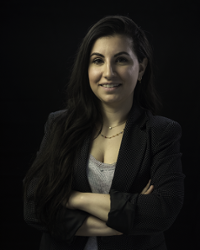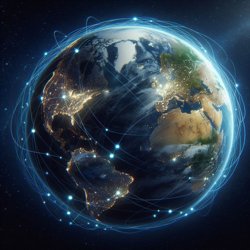'Develop legislation for satellite data that does not hinder technological development'
We are using more and more data from satellites in space. But what does the law say about big space data? What is allowed, what is not allowed and where are new rules needed? Financially supported by the NSO and ESA, Dimitra Stefoudi conducted PhD research into this.
How did you come up with the idea of doing PhD research into the legislation surrounding satellite data?
'The subject came my way by chance. During my master's degree at Leiden University, I discovered how we use data from satellites and how much data the European Copernicus satellites collect. A lot. As a law student, I found that exciting. I had learned that we all have laws about what you can and cannot do with the data you collect. I wondered: what about data coming from space?'
What can you do with satellite data?
'The possibilities are endless. Think of communication and navigation. Almost all of us use it every day. But there are also endless applications of Earth observation data. I grew up in Greece. There you have forest fires every year. Satellite data can help to detect these fires early, so that you can fight them faster. And in the future it will be possible to predict, based on big data, where a forest fire is most likely to break out. This makes preventive measures possible. This is just one of countless examples. Governments use satellite images for infrastructure works, transport, urban development, to research climate change and more. And there are many commercial applications, such as precision agriculture.'
Companies like Google, Meta and Apple are not allowed to do everything with the data they collect. What rules already exist for data from space?
'Space applications and certainly those of earth observation are relatively new. So there is not much specific legislation yet. In many cases we therefore look at laws that apply to information technology on earth. Laws about how you collect, use, distribute and dispose of data. This can be about privacy, but also about cyber security and issues surrounding the intellectual property of the data. In my dissertation I mainly focused on European legislation and regulations. That is what we as an EU member state must adhere to.'
What do you think should be paid attention to in the development of new laws and regulations?
'Laws and regulations must be better aligned with how space technology works. Take ground stations for example. Europe has drawn up rules on cyber security of ground stations that receive satellite data from space. But the satellites that transmit the data are not subject to the same laws. Maybe that's possible, we'll have to investigate that. Another example is privacy. Satellite data may contain personal information. A license plate of a car, the location where you are staying. In theory you can use this data to identify people. When I started my research five years ago, this topic was hardly an issue. Now it is an important topic of conversation. We don't have to be afraid, but we do have to clearly record how we handle that data in relation to our privacy.'

Your research is about big data. Does a larger amount of data cause specific problems?
'Yes. We also see that here on earth. If you work with large amounts of data, that data is often stored and processed in different data centers in different countries. Which legislation are you based on? The same goes for the users, who are also spread all over the world. So you have to look at the entire chain of that data, from observation to storage, processing and use.'
You made recommendations in your dissertation. What are the most important?
'First of all: see where and how you can incorporate space data into existing laws and regulations. That is a lot easier than creating new, international space legislation. Cyber security is one of the most important themes to address. This is currently insufficiently regulated for satellite data. We will also have to develop new legislation for situations that cannot be accommodated anywhere. That legislation should answer questions such as: which organization could be responsible for the governance of satellite data? And who is responsible when the collection, processing or use of satellite data leads to damage? What is very important: we must implement the legislation in such a way that it does not hinder the development of new technology.'
Why is it important that legislation does not become a brake on technological development?
'We now have a very positive view of the possibilities of satellite data. They provide great added value in our own lives and for society as a whole. We must maintain this momentum. It would be a shame if people started thinking of the word satellite data in terms of limitations, instead of opportunities. The NSO is doing good work in this area, as is the EU. Governments are developing strategies for the safe and effective use of space data. I have often wondered why I actually did this PhD research. And this is the answer: to give big space data a positive future. There are so many satellites, which together produce so much valuable data. It would be a shame if we did not try to get the most out of it for our future here on earth.'